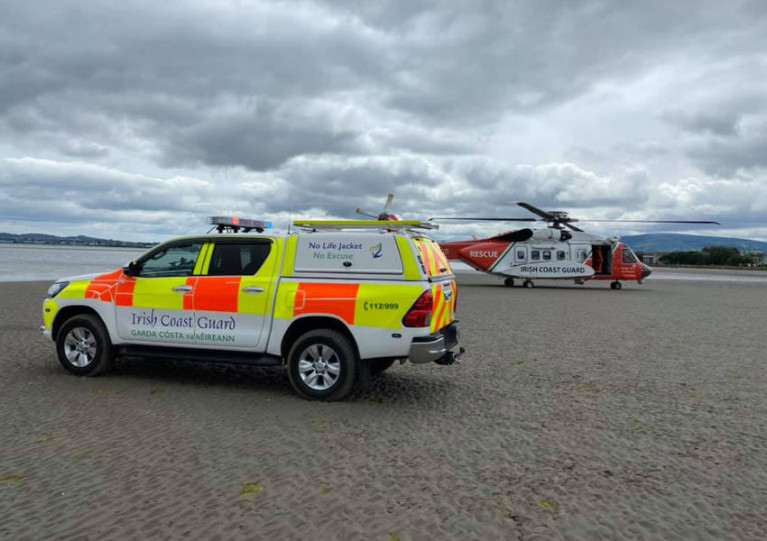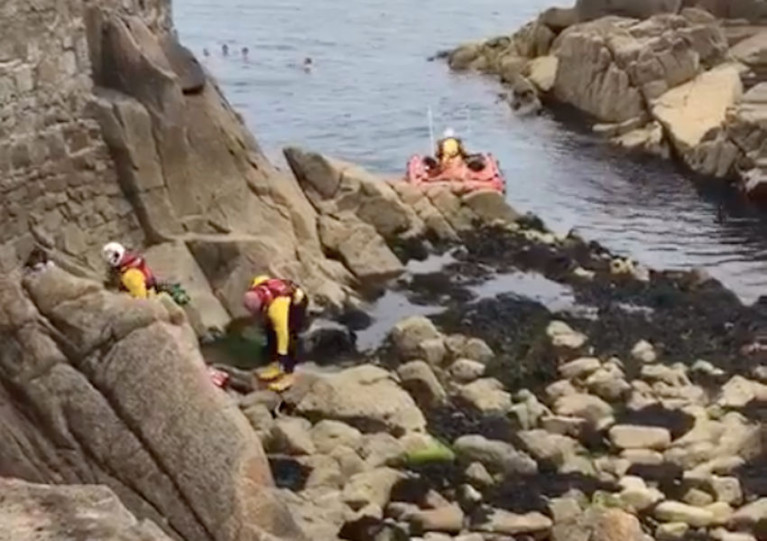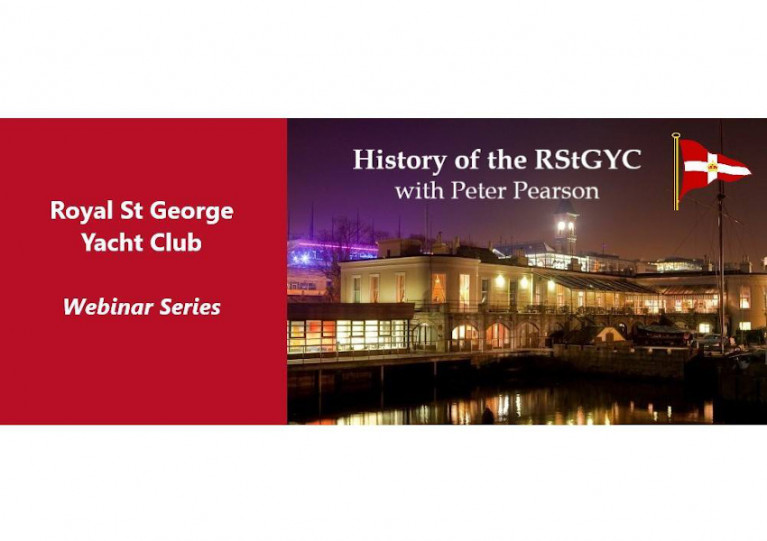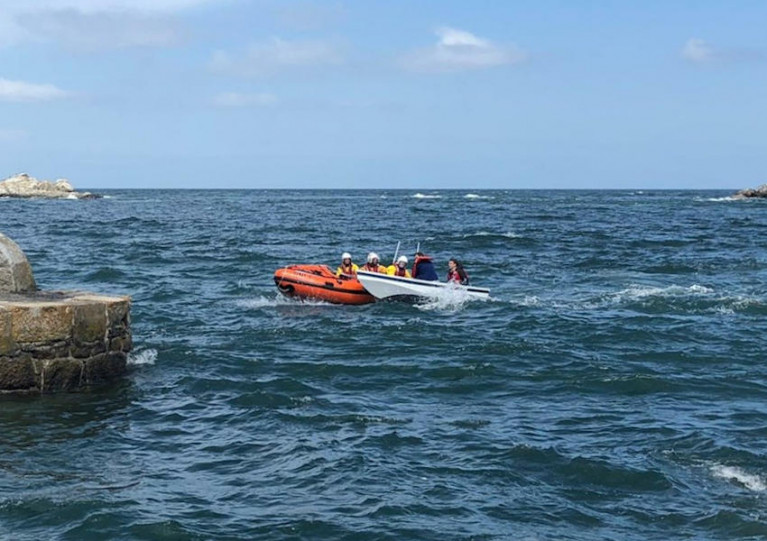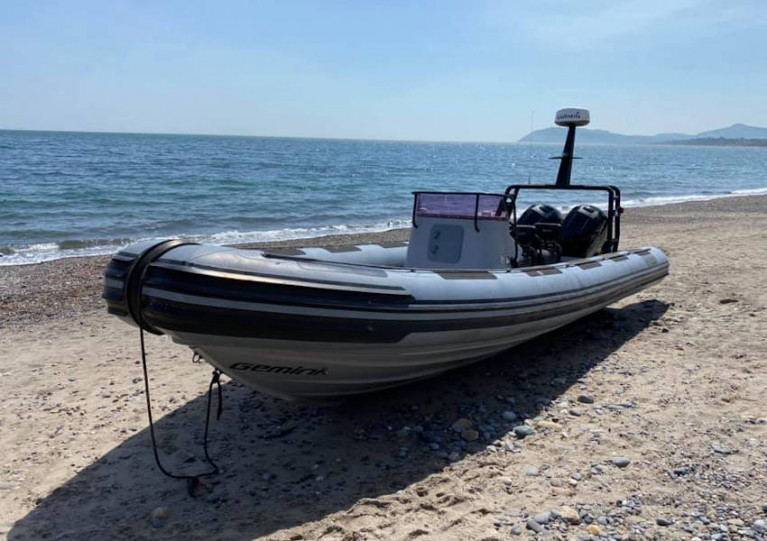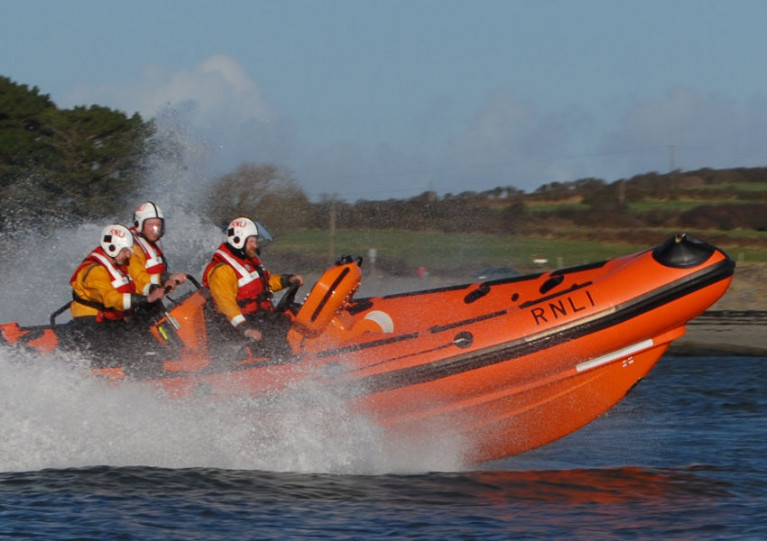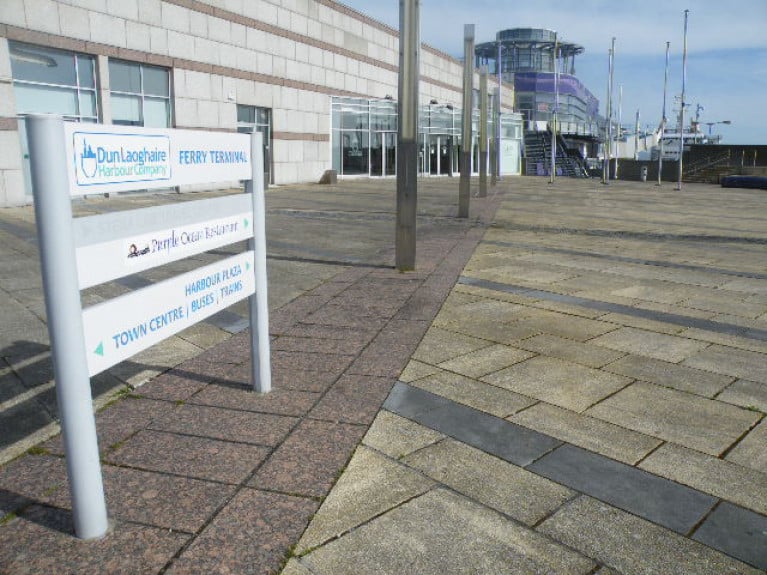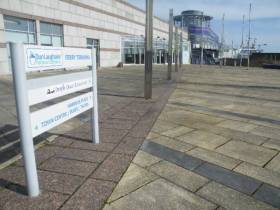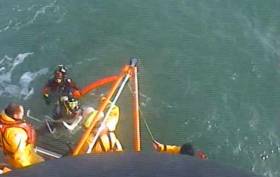Displaying items by tag: Dun Laoghaire
The Irish Coast Guard’s Dun Laoghaire unit launched to the rescue of a family of four cut off by the tide on Sandymount yesterday afternoon, Saturday 25 July.
Dun Laoghaire Coast Guard were tasked to incident along with the local RNLI’s inshore lifeboat and the Dublin-based coastguard helicopter Rescue 116.
The two adults and two children were retrieved from their sandbank by the helicopter crew, who landed them at a safe spot on land where they wiremen by a coastguard team. All were found to be in good spirts.
Emergency services remind the public if you see anyone in difficulty in or near the water to dial 112/999 immediately and ask for the coastguard.
Faller At Forty Foot Is Stretchered To Safety
Dun Laoghaire’s coastguard unit was tasked yesterday (Sunday 12 July) to assist paramedics with a casualty who had fallen down steps at the Forty Foot bathing spot.
Dun Laoghaire RNLI’s inshore lifeboat was also in attendance at the scene, where local lifeguards in Sandycove treated the casualty before the arrival of emergency services.
Dun Laoghaire Coast Guard says the patient was stabilised and stretchered to an awaiting ambulance for further care.
Royal St George Yacht Club members are invited to join Peter Pearson as he takes a journey back in time with an engaging talk about the history of the Dun Laoghaire Waterfront club.
Peter is a native of Dun Laoghaire and has had a long association with the town and harbour, producing well-known local history books such as Dun Laoghaire: Kingstown and The Forty Foot: A Monument to Sea Bathing.
The special online talk will be hosted on the Zoom platform this Thursday evening 18 June from 7.30pm. Club members can register via the link on the Facebook post HERE.
Dun Laoghaire's heritage harbour has not escaped the vandalism of graffiti 'artists' this summer. Unoccupied cut-stone buildings on the town's West Pier are the latest to be blighted by the spray can.
A number of vacant harbour buildings including those on the West Pier will be part of the upcoming new plan for the harbour as Dun Laoghaire Rathdown County Council attempts to breathe new life into the victorian structures.
Expert advice on strategic advice and an economic plan for the harbour on Dublin Bay is being sought by the Council.
As Afloat previously reported, a leading maritime figure at Ireland's biggest boating centre has called on the Council to plan for the appropriate development of the harbour as a maritime leisure centre.
The council says graffiti poses a significant problem throughout the Dun Laoghaire area. To report graffiti, contact 01 2054817 or email [email protected]
Dun Laoghaire RNLI launched the station’s inshore lifeboat to assist two people onboard a small rowing boat on Dalkey Sound yesterday afternoon (Sunday 7 June).
The volunteer crew of three immediately launched the lifeboat at 1pm after a report from the Irish Coast Guard of two people onboard a small rowing boat having difficulty getting back to shore.
The crew — consisting of helm Nathan Burke, Laura Jackson, and Jack Shanahan — arrived at the scene 15 minutes later and took the rowing boat under town and back to shore at Coliemore Harbour.
Jackson, who is also Dun Laoghaire RNLI’s community safety officer, said: “It is important to highlight the RNLI and Irish Coast Guard’s message at the moment asking people to take extra care when using the sea.
“Please make sure you have a plan of action in case you get into difficulty, always check the tide times and weather conditions along with having a method of communication to call for help if needed.
“Dun Laoghaire RNLI remains on call and is fully operational during the coronavirus pandemic. While there is no crew training or exercises taking place, our volunteers are here, ready to respond to those in need.”
On the same day that Dun Laoghaire Coast Guard assisted the local RNLI in aiding a boat in distress in Dublin Bay, the crew were also takes to investigate a mystery RIB on Killiney Beach.
It was quickly confirmed with locals, however, that the vessel had been beached the previous evening (Wednesday 27 May) and that the owner was aware and planned to reflect it at high tide.
More recently (Friday 29 May) Dun Laoghaire Coast Guard was tasked to get eyes on a jet ski reportedly broken down and adrift in Scotsman’s Bay.
A team was despatched to the area with RNLI Dun Laoghaire already en route. On arrival, the jet ski was located with the casualties taken aboard the RNLI offshore boat and the jet ski towed back to Dun Laoghaire Harbour to awaiting coastguard members.
With warm and sunny weather set to continue throughout the June Bank Holiday weekend, the coastguard appeals to the public to adhere to the safety advice and act responsibly in or near the water.
Seapoint, Sandycove and Killiney beach within the Dun Laoghaire-Rathdown County Council area now have active lifeguards in place which the coastguard welcomes.
“With the weather staying warm and dry over the Bank Holiday this weekend, we remind everyone to keep within your 5km distance from home, keep two metres from others and dial 112 or use VHF Channel 16 if someone is in difficulty in or near water.”
Kilrush RNLI’s inshore lifeboat aided in the rescue of a child swept out to sea on an inflatable lilo.
The incident yesterday afternoon (Thursday 28 May) occurred shortly after 3pm off Beal Strand on the Kerry shore of the Shannon Esturary.
It’s understood the casualty, a young girl, had been swept out to sea due to strong winds and tides in the area.
Lifeboat volunteers arrived on scene as the Shannon-based Irish Coast Guard helicopter Rescue 115 had located the casualty some distance from shore and winched a crew member to the water to assist her.
The girl — who was found to be distressed and had swallowed water — was assessed on board the lifeboat before being taken back to Beal Strand, from where she was transferred to Rescue 115 and flown to University Hospital Kerry in Tralee as a precaution.
Press officer Charlie Glynn said: “Thankfully this rescue had a successful outcome and the young girl was reunited with her family.”
He added: “As the current Covid-19 restrictions continue to apply, the RNLI are fully operational and on call 24/7. We ask everyone to follow Government travel instructions.”
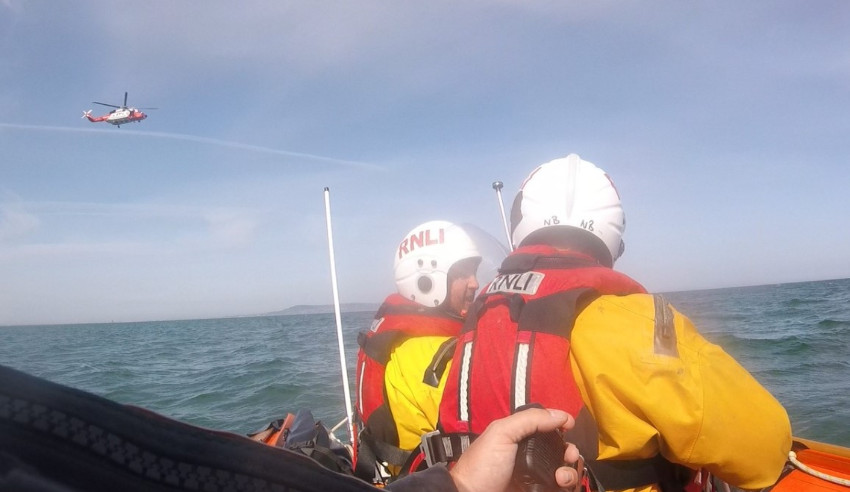 Dun Laoghaire RNLI crew on the inshore lifeboat Realt Na Mara | Photo: RNLI/Liam Mullan
Dun Laoghaire RNLI crew on the inshore lifeboat Realt Na Mara | Photo: RNLI/Liam Mullan
Elsewhere yesterday, Dun Laoghaire RNLI launched its inshore lifeboat to a vessel with four on board believed to be sinking in Dublin Bay.
On arrival at the scene it was found the boat was not taking on water but had mechanical issues, and the lifeboat took it under tow to the safety of Dun Laoghaire Harbour.
Edward Totterdell, Dun Laoghaire RNLI’s deputy launching authority, said: “It has been a busy week for our station and volunteer crew having responded to four callouts from the Irish Coast Guard so far.
“It is important to highlight the RNLI and Irish Coast Guard’s message this week asking people to take extra care when using the sea.
“Dun Laoghaire RNLI remains on call and is fully operational during the coronavirus pandemic. While there is no crew training or exercises taking place, our volunteers are here if people need us.”
Sailing School Shows Support For Dun Laoghaire Harbour Food Court Plans
Proposals for a ‘food court’ at Dun Laoghaire Harbour’s currently vacant ferry terminal have been welcomed by one leading local stakeholder.
In a written submission seen by Afloat.ie, Alistair Rumball of the Irish National Sailing & Powerboat School supports the new plans as “the harbour area badly needs year-round footfall, employment, visitors and economic activity, that this change of use both facilitates and drives”.
As reported last month on Afloat.ie, the change is being sought on behalf of Lapetus Investments Ltd to replace the proposed ground floor restaurant and drink vending elements of planning permission approved last year for a mixed-used co-working development at the St Michael’s Pier site.
Rumball adds that, from the standpoint of his more than 40 years of experience in the marine industry, he believes this change of use “will not impinge on the use of berths alongside the former ferry terminal building for commercial vessels, nor restrict a future ferry service”.
The final date for observations on this planning application is this coming Monday 20 January.
Planning permission is being sought to convert the ground floor of Dun Laoghaire’s ferry terminal building into a ‘food court’.
A site notice posted Tuesday 3 December on behalf of Lapetus Investments Ltd announces the intention to replace the proposed ground floor restaurant and food and drink vending elements of planning permission approved last year for a mixed-use co-working development at the St Michael’s Pier site.
Dun Laoghaire-Rathdown County Council has confirmed that there are no charges to view current planning applications that are online or if you visit County Hall on Marine Road.
A submission or observation may be made in writing to the planning authority on payment of a fee of €20 within five weeks of receipt of the application by the authority.
Update: A previous version of this article stated that the planning application may be inspected or purchased “for a fee not exceeding a reasonable cost of making a copy” at the offices of Dun Laoughaire-Rathdown County Council’s planning department during public hours (weekdays 10am to 4pm). This has since been corrected by DLRCoCo.
Dun Laoghaire RNLI Rescue Two Divers on Dublin Bay (Video)
Two scuba divers were rescued on Dublin Bay this afternoon by Dun Laoghaire RNLI after the pair became separated from their boat.
The incident occurred shortly before 3 pm when the divemaster on the surface reported the overdue divers to the Irish Coast Guard.
Dun Laoghaire RNLI All-Weather lifeboat was requested to launch immediately along with the Irish Coast Guard Rescue 116 helicopter based at Dublin Airport. The Dublin Port Pilot boat also responded to the ‘Pan-Pan’ alert and joined in the search close to Dalkey Island. The Dun Laoghaire RNLI Inshore lifeboat was also preparing to launch.
The RNLI All-Weather lifeboat located the casualties south-east of the Muglins Rock fifteen minutes after launching. The two divers had drifted approximately three-quarters of a nautical mile from their dive site. Conditions on scene included a difficult swell left-over from the tide flowing against a fresh northerly wind.
Both casualties were taken on board the lifeboat and taken back to Dun Laoghaire to a waiting HSE ambulance for precautionary checks. Both had been in the water for more than one hour when rescued.
‘This is the outcome that we always hope for and comes from co-operation and training between all the agencies involved,’ commented Stephen Wynne, Lifeboat Operations Manager at Dun Laoghaire RNLI. ‘The casualties remained calm, followed procedure and linked together to ensure they could be spotted.’



























